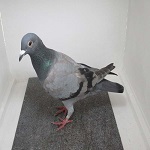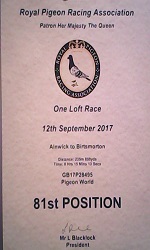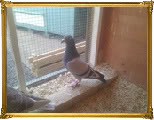| Countrywide Corns |  |
| Forum Syndicate 2019 | Pigeon World Forum Syndicate Bird takes 44th Place, in the 2019 RPRA One Loft Final.The Bird is Frans Zwol Bloodline, Bred and supplied by Darren Palmer (Oldstrain)  |
| Forum Syndicate 2019 | Pigeon World Forum Syndicate also takes 100th Place, in the 2019 RPRA One Loft Final. The Bird is Frans Zwol Bloodline, Bred and supplied by Darren Palmer (Oldstrain)

|
| Who is online? | In total there are 23 users online :: 0 Registered, 0 Hidden and 23 Guests :: 1 Bot None Most users ever online was 833 on Wed Nov 10, 2021 12:30 pm |
| Forum Syndicate 2017 | Pigeon World Syndicate Bird takes 81st Place in the 2017 Final Race, The Bird is Dia Evans Bloodlines and was Bred and supplied by Tumley Lofts Stud.  |
| R.P.R.A Certificate. | Pigeon World Forum Syndicate take 81st Place in the 2017 R.P.R.A. Final, with a Pigeon Bred and Supplied by Tumley Lofts Stud. |
| Top posting users this week | |
| Statistics | We have 1297 registered users
The newest registered user is tharunjohar50
Our users have posted a total of 222809 messages in 14005 subjects
|
| Oldstrain/Darren`s Winner of winners. 2012. |  |
| From Fed Topper to Master Chef |  The N.E.H.U race from Melton Mowbray 21/4/2012 was won by Peel bros of South Shields, they took 1st club 1st fed, also taking 2nd and 4th club and 15 of the 25 birds clocked in the club......well done Peel brothers. The N.E.H.U race from Melton Mowbray 21/4/2012 was won by Peel bros of South Shields, they took 1st club 1st fed, also taking 2nd and 4th club and 15 of the 25 birds clocked in the club......well done Peel brothers. |
| | | Pro Biotic Health In Pigeons |  |
| | | Author | Message |
|---|
Gaz b
Oldbird


Posts : 6221
Join date : 2011-10-06
Age : 60
Location : Coming to a club near you
 |  Subject: Pro Biotic Health In Pigeons Subject: Pro Biotic Health In Pigeons  Fri Jul 06, 2012 9:11 pm Fri Jul 06, 2012 9:11 pm | |
| The Probiotic "Health Dividend"
Part one in a series of articles about how Probiotics and Prebiotics effect the health of our birds.
The digestive tract of a racing pigeon, is home to a number of microorganisms, including various types of protozoa, bacteria, and fungi (includes yeast). The normal relationship between these microorganisms and the host (racing pigeon) is symbiotic, meaning "the living together of dissimilar organisms". Symbiotic relationships are classified as either commensal, mutualistic, or parasitic. A symbiotic relationship is commensal when one organism derives food or other benefits from another organism without hurting or helping it. A symbiotic relationship is mutualistic when both organisms derive a fitness benefit. Finally, a symbiotic relationship is parasitic when one member of the association benefits while the other is harmed.
Concerning the symbiotic relationship which exist between our racing pigeons and the protozoa, bacteria, and fungi which reside within the birds, the normal relationship is either commensal or mutualistic, and the normal effect of these microorganisms (protozoa, bacteria, and fungi) on the host (the racing pigeon) is to provide important services which enhance the overall health of the bird's ecology.
When populations of protozoa, bacteria, and fungi are in their proper numbers and relationships, they tend to inhibit and control one another, keeping the mix from becoming lop-sided and "pathological". If one or another of these populations explodes, it may throw off this balance, resulting in one or more diseases for the host.
If we examine the bacterial populations of a healthy racing pigeon's digestive tract, we will find that it contains approximately 80% "Friendly Bacteria" (beneficial strains) and 20% of what we often call "Bad Bacteria". These so called "Bad Bacteria" are not bad when they are controlled, as they contribute in some functional way to the overall health of our birds. Normally, it is only when the populations of good bacteria fall below the 80% level, that the health of our birds begin to suffer from the presence of the so called "Bad Bacteria" strains.
The problem is really more complex than that, if the protections provided to the digestive tract by these colonies of "good bacteria" are diminished, then not only will the so called "Bad Bacteria" strains move to fill this niche, but also yeast, fungi and protozoa (like cocci and canker) will attempt to exploit the reduction of Good Bacteria colonies to further expand their populations, even becoming "pathogenic".
If we were to cut out a section of the intestinal lining from one of our birds and lay it flat under a microscope, we would find that it is not a smooth surface. Rather, the intestinal lining would appear to be covered with mountains and valleys and the whole surface would appear to be heavily forested. The folds (mountains) increase the surface area of the intestinal lining by about 100% and the trees (forest canopy) increase the surface area by 1000% percent. Yes, that is right 1000%.
The trees of the forest, are called "villi" which are long columns of specialized tissues, extending up from the mountains and valleys of the intestinal lining, much like bristles on a hair brush. These specialized tissues serve many functions in the health and well being of our birds including nutrient absorption, pathogen identification and repulsion of pathogenic invasions.
Along the surface of the villi are specialized cell tissue which identify pathogens and send warning signals to the immune system when the presence of pathogenic invaders is detected. Another type of specialized cell tissue called "goblets", elude secretions containing antibodies and immunoglobulins which inhibit pathogens from penetrating the epithelial lining of the digestive tract.
This whole system of epithelial cells, villi, specialized tissues and secretions is called the "mucosal barrier". This barrier is the first line of defense against pathogens, by the intestinal lining. It is above the mucosal barrier that the so called "good" and "bad" bacteria grow and live. When these bacterial populations are in natural balance, they protect the "mucosal barrier" and aid in nutrient breakdown and absorption. These bacteria also produce certain organic acids, hydrogen peroxides, bacteriocins and other by-products that are antagonistic to pathogenic growth. Anything that disturbs the proper balance and distribution of the so called "good" and "bad" bacteria, also disturbs the natural protection that these bacteria provide to the mucosal barrier.
When all defenses are working properly, 98% of all pathogenic invaders are neutralized and flushed out of the digestive tract without having penetrated the intestinal lining. However, when all defenses are not working properly, a pathogenic population may be successful in expanding its presence, displacing the "good bacteria" protective coating, overcome the mucosal barrier defenses and damage the epithelial cells that line the digestive tract . Once firmly established, the pathogenic colony penetrates or erodes the intestinal lining. Even if we are later successful in using medications or antibiotics against the pathogenic colony, the protective barrier defenses have still been breached and a condition called "leaky gut syndrome" now becomes a threat to the health of our birds.
It takes time for the intestinal lining to heal itself from a breach, and to re-establish its barrier defenses. In the mean time, other pathogens may exploit this weakness to pass through the breach before it can be fully repaired, spreading their toxins throughout the body. One unfortunate side effect of using certain medications and antibiotics, is that a percentage of the mucosal secretions (rich with its antibodies and immunoglobulins) may be stripped away by the chemicals, further weakening the intestinal lining's ability to defend itself.
Unfortunately, many fanciers depend to heavily on cyclical use of medications and antibiotics to preemptively control populations of protozoa, bacteria, and fungi, while ignoring the consequences of their actions on the 80% populations of "Good Bacteria" and the natural barrier defenses of the intestinal lining. Remember, my earlier statement; "When these populations of protozoa, bacteria, and fungi are in their proper numbers and relationships, they tend to inhibit and control one another, keeping the mix from becoming lop-sided and pathological".
Because most medications and antibiotics are targeted towards a specific pathogen or group of pathogens, we rarely kill off more than 1/3rd of the good bacteria populations during any one course of treatment. None the less, any time we treat the birds with medications or antibiotics we disturb the proper balance and distribution of the so called "good" and "bad" bacteria, and by extension disrupt the natural protective mechanisms that these bacteria provide to the mucosal barrier.
When we disrupt the bacterial balance we also disrupt the balance of yeast, fungi and protozoa in the bird's body. This is because established "good bacterial colonies" naturally produce certain organic acids, hydrogen peroxides, bacteriocins and other by-products that are antagonistic to pathogenic growth. Conversely, when we maintain the proper bacterial balance, we reap a "health dividend", because this natural balance within the bird "controls" the populations of bacteria, yeast, fungi and protozoa before they become "pathogenic", and this frees up the resources of the natural immune response to deal with other pathogenic infections as needed.
Those of you who are regular users of medications and antibiotics, think on this: because you use these treatments, you are diminishing the populations of good bacteria. One consequence of this is that the remaining populations of good bacteria are producing less organic acids, hydrogen peroxides, bacteriocins and other by-products which are antagonistic to pathogenic growth, this then produces an environment more conducive to the growth of pathogenic populations which may then lead to the need for more medications and antibiotics.
I am not saying that you should totally abandon the use of medications and antibiotics, only that you should investigate the "all natural" alternatives being used by many in the sport today. If there are natural products that inhibit the growth of pathogen populations and do not adversely affect the populations of good bacteria, then using these products have several distinct advantages.
You maintain the good bacteria populations and receive the "health dividend" of those good bacteria
Your birds are not flushing out the toxins related to medication and antibiotic usage
Pathogens are not building resistance to the medications and antibiotics that you use
You do not need a medicine cabinet full of products to address every possible pathogenic infection
Your birds are developing "Natural Immune Response"
You are saving money!
|
|   | | Don Webb
Oldbird


Posts : 14926
Join date : 2009-03-27
Age : 51
Location : Tipton
 |  Subject: Re: Pro Biotic Health In Pigeons Subject: Re: Pro Biotic Health In Pigeons  Sat Jul 07, 2012 12:23 am Sat Jul 07, 2012 12:23 am | |
| |
|   | | peel bros
Oldbird


Posts : 13064
Join date : 2009-03-27
Age : 59
Location : south shields
 |  Subject: Re: Pro Biotic Health In Pigeons Subject: Re: Pro Biotic Health In Pigeons  Sat Jul 07, 2012 12:26 am Sat Jul 07, 2012 12:26 am | |
| remember last season when i mentioned using probiotics,when we had 7 wins ,i took some stick from a few members on this site,i myself thought they made a massive difference to our birds..so i,m one for using them full stop |
|   | | Don Webb
Oldbird


Posts : 14926
Join date : 2009-03-27
Age : 51
Location : Tipton
 |  Subject: Re: Pro Biotic Health In Pigeons Subject: Re: Pro Biotic Health In Pigeons  Sat Jul 07, 2012 12:31 am Sat Jul 07, 2012 12:31 am | |
| |
|   | | Gaz b
Oldbird


Posts : 6221
Join date : 2011-10-06
Age : 60
Location : Coming to a club near you
 |  Subject: Re: Pro Biotic Health In Pigeons Subject: Re: Pro Biotic Health In Pigeons  Sat Jul 07, 2012 12:42 am Sat Jul 07, 2012 12:42 am | |
| Me too mate.
I have another couple articles that i will post up when I find them. |
|   | | Sponsored content
 |  Subject: Re: Pro Biotic Health In Pigeons Subject: Re: Pro Biotic Health In Pigeons  | |
| |
|   | | | | Pro Biotic Health In Pigeons |  |
|
Similar topics |  |
|
| | Permissions in this forum: | You cannot reply to topics in this forum
| |
| |
| |
